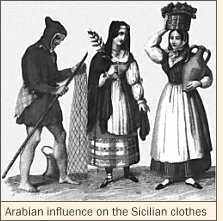|
 When the Roman Empire of west failed (V century AD), on the southern coasts of Sicily the arabs began to raid, inciting people to the Holy War against the unfaithful christians. Their raids continued in VII, VIII, IX centuries. In 827 they came with more than ten thousand of men with the purpose of conquering the whole Sicily. They landed at Mazara and completed the invasion with the conquer of Tauromenium in 902. The town resisted the assaults till when the emir succeeded in going into the town from Cuseni Gate, then called the Gate of Saracens, just to remember the unhappy invasion. The town was sacked and destoyed. Women, old men and children, wherever they were, into the churches too, were slaughtered. Monuments and churches were knocked down. The bishop of Tauromenium, Procopio, fugitive, was recognized and captured. Ibrahim ordered to pull out Procopio's heart from his breast and ate it behind the people. Procopio's martyrdom was painted in a fresco which we can admire in the Church of Saint Pancratius. Survivors were sold as slaves. Girls on one hand were bought by the caliph to populate the harems of Bagdad, on the other they were sold as brod-mares to mingle the mediterranean race with the arab one. According to the legend, the firmament too cried for the dreadful massacre of Tauromenium. In reality, during that night in Ago 10, 902, the sky brighted for a plentful rain of meteorites. When the Roman Empire of west failed (V century AD), on the southern coasts of Sicily the arabs began to raid, inciting people to the Holy War against the unfaithful christians. Their raids continued in VII, VIII, IX centuries. In 827 they came with more than ten thousand of men with the purpose of conquering the whole Sicily. They landed at Mazara and completed the invasion with the conquer of Tauromenium in 902. The town resisted the assaults till when the emir succeeded in going into the town from Cuseni Gate, then called the Gate of Saracens, just to remember the unhappy invasion. The town was sacked and destoyed. Women, old men and children, wherever they were, into the churches too, were slaughtered. Monuments and churches were knocked down. The bishop of Tauromenium, Procopio, fugitive, was recognized and captured. Ibrahim ordered to pull out Procopio's heart from his breast and ate it behind the people. Procopio's martyrdom was painted in a fresco which we can admire in the Church of Saint Pancratius. Survivors were sold as slaves. Girls on one hand were bought by the caliph to populate the harems of Bagdad, on the other they were sold as brod-mares to mingle the mediterranean race with the arab one. According to the legend, the firmament too cried for the dreadful massacre of Tauromenium. In reality, during that night in Ago 10, 902, the sky brighted for a plentful rain of meteorites.
In 909 christians rebuilt the town, but in 962 the arabs, after a siege which lasted seven months, conquered and sacked it again. The caliph called it Almoezia and since then the arab domination lasted two centuries and half.
While the arabs were plundering and blood-thirsty in their assaults, in administration of territories they were wise. They brought innovations in agricolture (production of honey, mulberry, orange and lemon), in irrigation systems and techniques for captation of waters. Classic philosophy was spread and studies in medicine, chemistry and mathematics progressed (the still in use system of numbering is the arab one). They adopted a system for the collection of taxes which was less oppressive. They fostered the forming of little property and relieved the slaves condition.
During the arab domination, christians could live according to their religious faith; the only one forbidden thing was building new churches, bringing the cross during the procession, ringing the bells. It was then that, close to the old towers, were built minarets and mullions.
About the arab architecture Sicily has no more a lot, because the normans destroyed all the mosques.
In each town of the island and, then, in Taormina too, we can find some traces of the arab domination.
In a particular manner, the arab presence brought a significant linguistic enrichment.
Islamism brought progress not only in Sicily, but in southern Europe too, in Middle East and in East.
All that aroused alarm in the Roman Church.
|
![]()